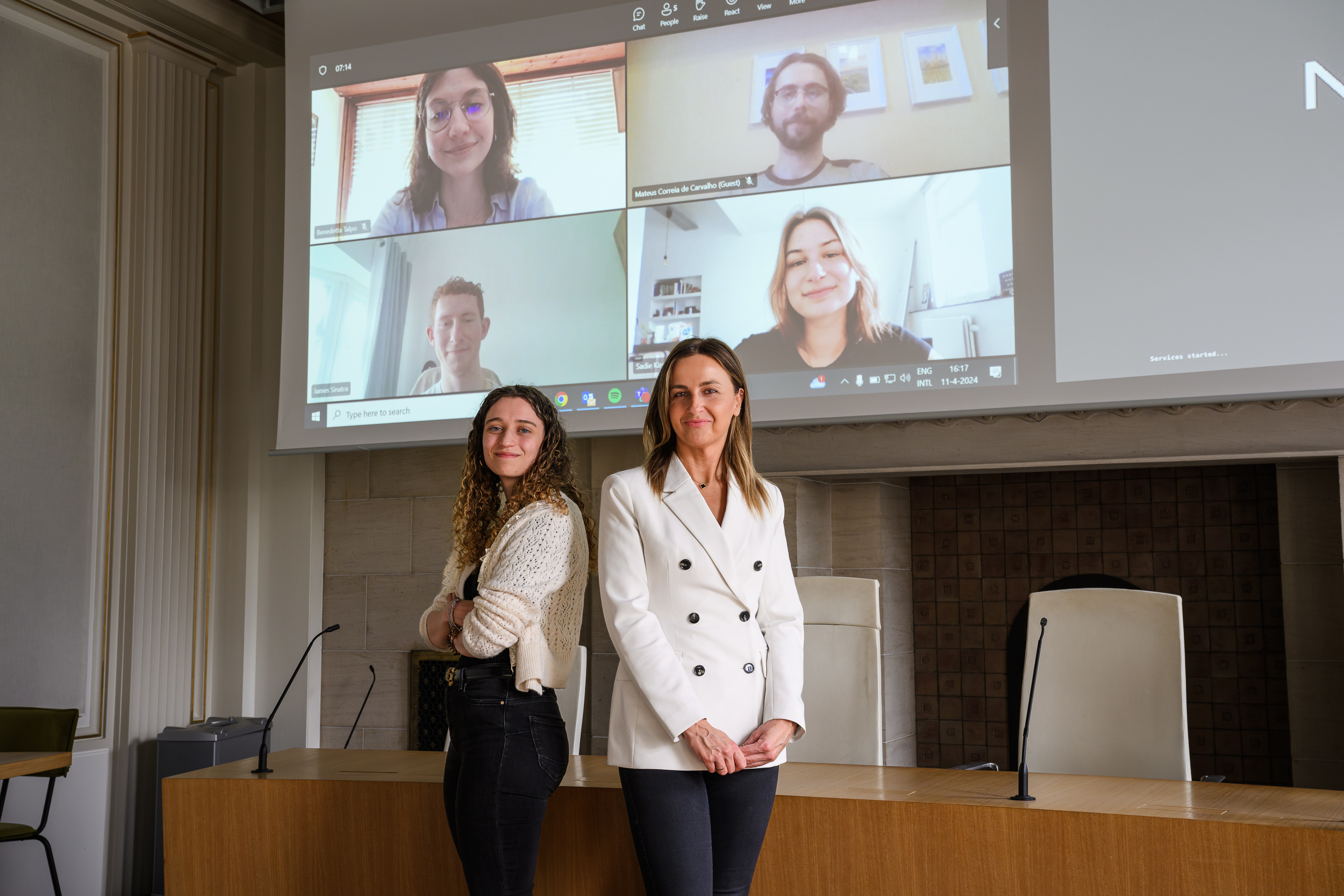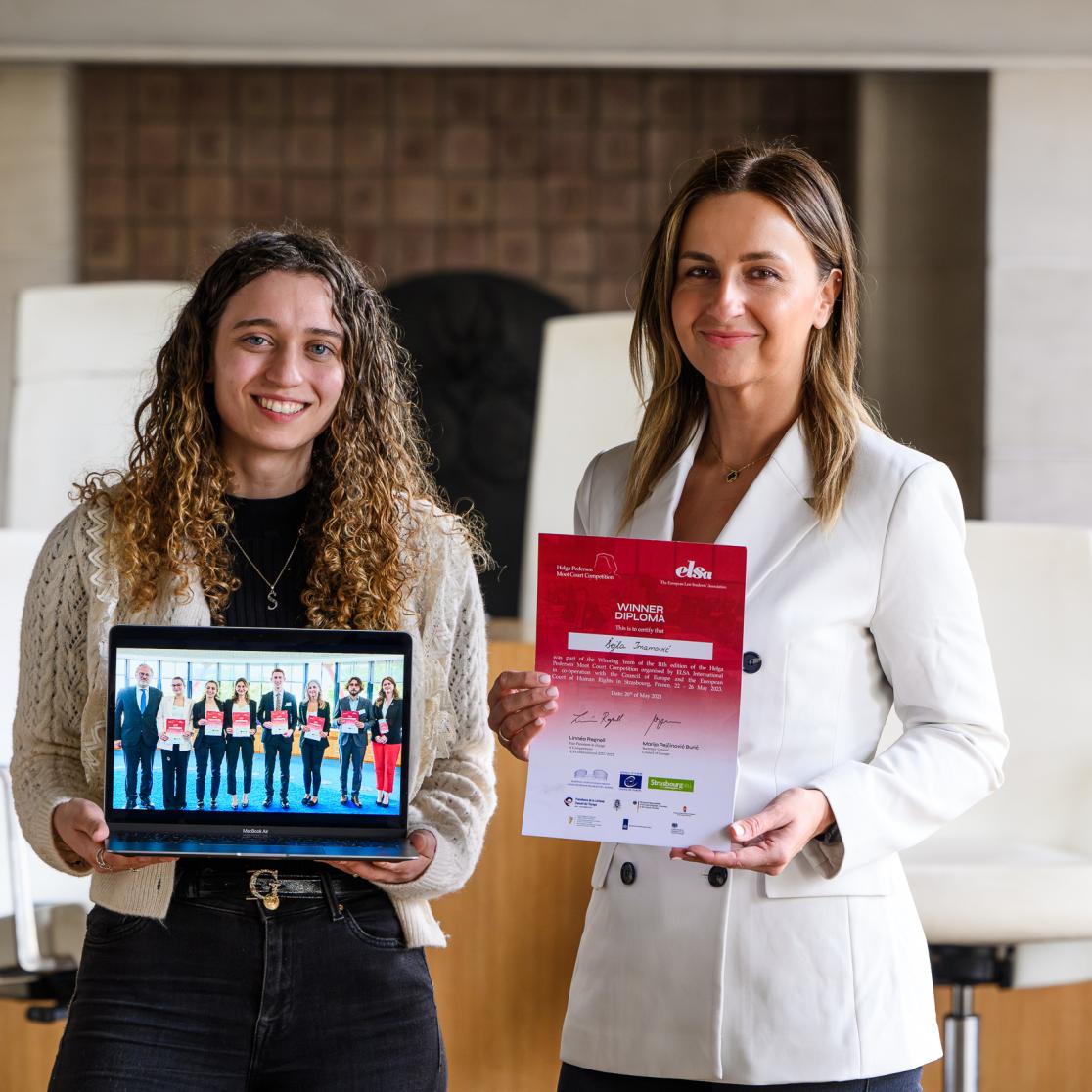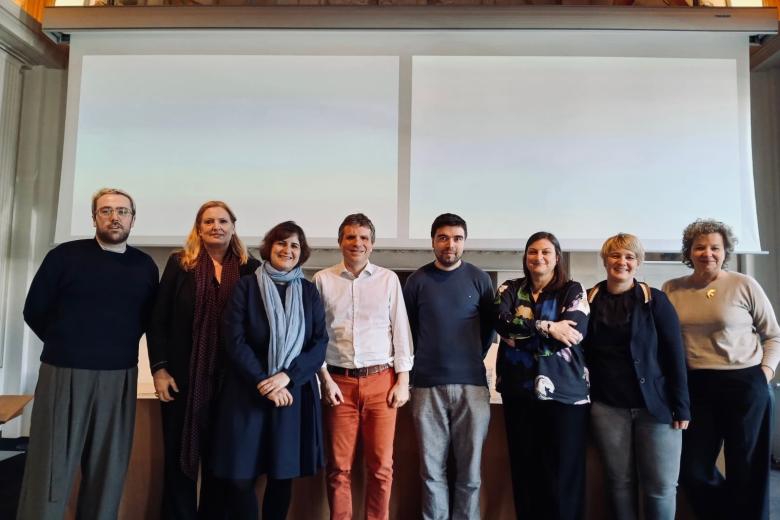Mooting competitions: a great value for future lawyers and our faculty
Last year, the Maastricht University’s moot court team won the Helga Pedersen Moot Court Competition in Strasbourg. Now, almost a year since their win, the team meets again to look back on their experience.

The moment of the interview is like a little reunion for most team members: most of them haven’t seen each other for a long time. When their moot court journey began, Sadie Kinnersley and Benedetta Talpo were in their last year of the European Law bachelor and now started their masters. Saskia von Landenberg did a master in European Public Law and Governance and now lectures public law. And as a law student from the University of Exeter, James Sinatra studied at the Faculty of Law during his year abroad. Mateus Correia De Carvalho, who now is in Italy for his PhD research, and Šejla Imamović, assistant professor of European Human Rights Law, coached them.
Moot courts explained
It’s a simulated court proceeding where law students argue hypothetical cases before a panel of judges. Each team presents oral arguments and responds to questions from the judges. “The Helga Pedersen Moot Court Competition focuses specifically on human rights,” Šejla starts to explain. “This competition exists since 2012 and is organised by Elsa and the Council of Europe. It provides students to immerse themselves into the intricacies of European Human Rights Law, and explore different ideas and discuss sensitive issues that we have in human rights law. And if you win, you get the unique chance to do a traineeship at the European Court for Human Rights.”
This year’s case was about a same sex couple who had made a contract with a surrogate mother for a child. However, after the child was born and lived with the couple, the surrogate mother changed her mind. It was a case that involved topics as surrogacy, adoption, couples’ rights, but also discrimination. “It was not just a case of discrimination,” Mateus says. “It’s this new term of intersectional discrimination, a new concept in the field of equality law. I remember that one of our first meetings with the team supposed to last an hour, but it ended up taking three hours just to define the subject with the students.”
Becoming a team
With each their own personal motivations in mind, Sadie, James, Benedetta and Saskia applied to be part of the 2023 team. “If I can find an opportunity to speak for an extended period of time, I’ll do it,” James starts sharing his motivation. “This moot court competition felt like an opportunity that was offered when I was in Maastricht. It was something I wasn’t able to do at my university in England.” Sadie follows: “I did speech and debate in high school and I think it’s a cool and real-world way to apply the knowledge year learn during classes.”
As coaches, Šejla and Mateus had the task to put together a team. After carefully selecting students from among all the applications, it took them two days to conduct interviews. “We valued sincere passion for the topic, and looked for different profiles and qualities,” Mateus says. “It’s not just public speaking, but also quickness in reasoning to show knowledge of the topic and researching.” The coaches also looked for a good mix of strengths. “Nobody is perfect, and among different individuals there are many strengths but also some weaknesses. And that’s a good thing, so everyone can learn from each other and ultimately grow together,” Šejla adds. “We had to keep their personalities in mind, as far as we knew them from the interviews. We want to make sure that it will work as a whole.”
The road to Strasbourg
From September 2022, it was go-time, a period with lots and lots of meetings to prepare followed. “We already knew what case we had to plead, so we basically sat down with the team every week for multiple hours to practice our pleading,” Benedetta says. “Sometimes we invited guest judges, so we’d also experience the different types of questions. During the regional rounds and the finals in Strasbourg, we also listened to the arguments of other teams, which helped us further develop ours.”
In the end, many arguments that were prepared in the beginning didn’t make it to the final rounds. Because the competition stretches over a long period, arguments change and develop. Every round, the students gained more knowledge by doing research or listening to opponents. “While James and Benedetta were presenting their case, Saskia and I took notes to help them respond to opposing arguments or answer questions from the judges,” Sadie adds. “We all knew the claims so much in detail; we could easily help each other out.” All that hard teamwork paid off: on 26 May 2023, after all the preparations and different competition rounds, they were declared winners of the eleventh Helga Pedersen Moot Court Competition.

"There’s so much positive to take out of this for students and coaches. This reflects the importance of moot courts in the curriculum of a university, to make it accessible to more students.”
Skilled for their future
In less than a year, Sadie, James, Benedetta and Saskia developed and gained skills that will benefit them in their future careers. “Personally, I could really see a learning curve throughout the whole experience, specifically on public speaking,” Saskia says. “Maybe it's a bold claim, but I think there is little in law school that prepares you as much for the practical side of legal practice; especially in relation to research skills and soft skills. It is a good addition to the basis of your legal education." A claim that every team member agrees on. Mateus adds: “Most people who do moot court exercises will agree. There’s so much positive to take out of this for students and coaches. This reflects the importance of moot courts in the curriculum of a university, to make it accessible to more students.”
But it’s not just the students who learn during these competitions. Šejla coached multiple moot court teams over the last years. “I’ve always been an academic ever since I finished my studies, so I never really practiced law. This experience I get every year, is a connection with how it would be in practice,” she explains. “I learn alongside my students and find it really rewarding and fulfilling to see them grow to that extent.”
Mooting as a faculty’s mark
Does the faculty also benefit from this big win? It does. It attracts students who are looking for universities that offer these chances. Like Sadie, who first stepped into the faculty five years ago during a tour with a student ambassador. “She told me about the extracurricular courses, like mooting. This year, crazy as it sounds, I was recognized by other students because I was on last years’ winning Helga team”, she laughs. “It’s definitely good for the current student body in the faculty. They all really like to hear about the wins and it motivates them to participate.”
Want to know more about mooting competitions? Our faculty has a strong reputation in various competitions at national and international level.
Also read
-
Andrés Caceres Solari on No room for Human Rights in Gaza and Ukraine: How the Law Legitimizes Urban Devastation
Pick Our Brains Session with Andres Caceres Solari

-
Teacher Information Points at UM
UM faculties now host Teacher Information Points (TIPs) that offer local, “just-in-time” and on-demand support for teaching staff. The aim is simple: to provide help that is closely connected to day-to-day teaching practice.

-
Globalisation & Law Network seminar with Damian Chalmers
On 4 November 2025, the Globalisation & Law Network had the honour of welcoming Prof. Damian Chalmers to discuss his paper “The EU’s Governing by Legal Shadows”.
